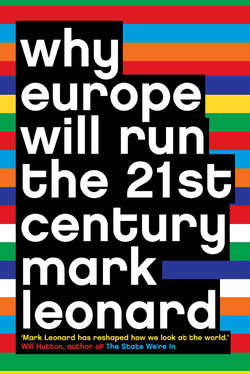Читать книгу Why Europe Will Run the 21st Century - Mark Leonard - Страница 8
CHAPTER 2 ‘Divided We Stand, United We Fall’
Оглавление1968 was a year of revolutions. What started in the Sorbonne in Paris as a protest about an outdated curriculum and the threat of a reduction in student numbers soon spread like wildfire around Europe and the United States. But the excitement was not limited to universities. Dee Hock, a middle manager in a bank in Seattle who had dropped out of community college after just two years, was starting a revolution of his own – one that could hold some important lessons for the European Union. Many have argued that Europe’s divisions will stop it punching its weight in the world, but Hock’s example shows that you can take over the world without developing a centralized bureaucracy.
Hock’s journey started when the bank’s headquarters appointed him to a committee that was working on a business strategy for its ailing credit card, Bankamericard. The backdrop was bleak. Credit cards had only existed for ten years and the infant industry was in chaos. Banks had dropped millions of unsolicited cards on an unsuspecting public that had no experience of credit facilities of this kind. Losses were thought to be in the hundreds of millions of dollars. Card owners were bankrupted, politicians were alarmed, and the media launched a feeding frenzy of blame-calling.
Instead of developing a new business strategy, Hock persuaded his superiors to start a new kind of organization: Visa. He was determined to move beyond the hierarchical companies that were products of the industrial revolution and create an organization based on biological concepts – a network. He wanted to create a franchise that would have global presence, but maintain competition between individual banks so that they would be driven to innovate.
The basic principle was to create a company that did not have shareholders but members. These members would own the company for ever but could not buy or sell their part of the company – which meant that it would be impossible for any individual member to gain control of the overall organization. Hock wanted to create an organization that would be both highly decentralized and highly collaborative. Authority, initiative, decision making, wealth – everything possible was pushed out to the periphery of the organization, to the members. What began with just a handful of modest banks in just twelve states grew into an organization that is now owned by over 21,000 financial institutions in 150 countries. Today Visa is responsible for the largest single block of consumer spending ($2.7 trillion annually), services 600 million people, and continues to grow at a rate of 22 per cent a year.1
In spite of its enormous economic power, Visa is effectively a skeletal organization with a tiny central administration and only three thousand employees in twenty-one offices around the world. It relies for its strength and success on enabling others to flourish. And that, says Hock, is exactly how it ought to be. ‘The better an organization is, the less obvious it is,’ he says. ‘In Visa, we tried to create an invisible organization and keep it that way. It’s the results, not the structure or management that should be apparent.’2
